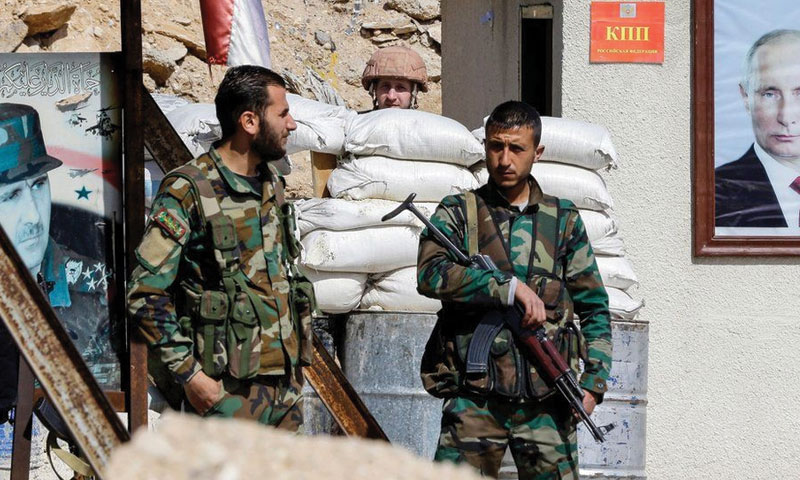



Crossings that resemble the international ones despite the short distance, a long waiting process at the security checkpoints and many other obstacles hindering their way to work or schools, this is how the people of Eastern Ghouta travel between their towns and the capital Damascus.
After most of the people of Eastern Ghouta’s towns departed to areas in Damascus and its rural parts, following the end of the battles that preceded the exist of the opposition faction, five months ago, the partial return of people to their homes and neighborhoods became an urgent need regardless of all difficulties.
Every now and then, some of the people need to enter their destroyed houses, the damage of which varies; others need to travel between their towns and the capital Damascus, as to pursue their jobs or study after they have lately returned to the remains of their houses.
The Assad’s forces controlled the eastern countryside of Damascus after they signed reconciliation agreements separately with each of the opposition factions in the area, including “al-Rahman Legion,” “Jaysh al-Islam,” and “Ahrar al-Sham,” late in April and early May.
Taking the road from the towns of Eastern Ghouta to Damascus requires security approvals and long waiting hours, in addition to an expected prevention of passage and the moody actions and assaults that people are exposed to.
The journey from Bab Sharqi in Damascus towards the towns of Ghouta starts with more than seven checkpoints, awaiting the people passing through them to their homes, carrying a security permit issued by the reconciliation committee and an evidence that shows where their current house is.
Muna is one of Ghouta’s residents and a student at a private institute in Damascus, tells Enab Baladi that “I do not have a university identity, and the officer in charge of the checkpoints, with a brigadier general rank, did not allow me to pass, asking me to bring a document stamped by the administrative director of the institute so I would be able to exit and enter.”
The residents of Ghouta are asked to bring documents proving their place of residence in Damascus, a rent contract or a paper from the mayor of the neighborhood hosting them, without which they cannot enter to check on their lands or properties.
The daily suffering of the people is obstructing their lives, jobs and education, says Hussam, one of the al-Malihah residents and a university student in Damascus, “I have to come two hours before my school’s time as not to be late due to the long waiting period at the security checkpoint,” adding that “this situation is arduous because it is daily and does not take place once a year.”
Moving furniture and the people’s other possessions is another story, as it needs a security document from the brigadier general in charge of the area, and the process does not end at this limit, for the people are forced to pay big amounts of money to the troops at the checkpoints, fearing that they would not allow their passage.
The road from Damascus to Ghouta is known for being rigid due to the battles and the piled rubble, as well as the absence of services because of Assad’s forces’ attempt to block the rest of the minor ways to restrict the civilians’ passage to the road they are in control of.
The journey to arrive at the towns takes one and half an hour at least, under the long waiting and the checkups at the checkpoints, which relate to the mood of the troops in regard of the identity of the passers, according to the classification of the towns and their former position of the opposition against the Syrian regime.
Some checkpoints repeat the security checkups three times; others enjoy keeping the people in long lines until they are given a positive or negative order of entrance.
According to what Hussam has told Enab Baladi, “to be clear, the towns which have been militarily controlled without an agreement providing for the departure of the opposition from them, their people are treated in a different manner than the areas which witnessed an agreement under the auspice of the reconciliation committees.”
Hussam described the situation in the Ghouta’s towns currently with housing a “big prison,” taking into consideration the restrictions and suffocation imposed by Assad’s forces at all the area’s entrances and roads, in return for the bad services that the towns are yet suffering.
Last September, the Syrian regime substituted the checkpoints in the areas under the army with others affiliated with the security branches, on top of which are the air intelligence and national security branches in the frame of the two campaigns of recruitment and security restrictions in the area.
Since the Assad’s forces took control over Eastern Ghouta, the area was divided into enclaves through checkpoints; some secondary roads were closed with earth mounds to force the cars pass through their posts for investigative ends.
The checkpoints are placed at the crossroads which connect cities together, especially at the city of Hamouriyah, separating the city of Saqba, the towns of Bait Sawa and Madiara, as well as the city of Arbin.
Some of the secondary roads between Zamlka and Ein Tarma were also closed, leaving only tow entrances for civilians, one of them connects Zamalka with Arbin and the other with Ein Tarma.
The checkpoints in the area separating Damascus from its eastern parts conduct accurate checkups, searching for military service escapees or people wanted by the military branches for investigation.
if you think the article contain wrong information or you have additional details Send Correction